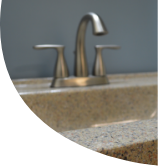How to Re-Caulk a Bathtub
Materials Needed…
Plastic putty knife OR a window scraper/utility knife
A sharp knife
Tube of silicone caulk
Caulk gun
Paper towels/old rag
Wet finger
Step-by-step Process…
1. If your bathtub has been previously resurfaced resurfaced use a plastic putty knife to clean the edge of your bathtub of the existing caulk, soap scum, and any mold. If your bathtub has not been previously resurfaced the you can use a window scraper or utility knife. Just be careful not the scratch the bathtub. Caulk is easily removed by making an incision the length of the seam at the top and bottom of the caulk lines.
2. Only use caulk that is 100% silicone as opposed to ‘siliconized’. These types of caulking will stretch more and repel mold and mildew due to its rubbery surface.
3. Using a sharp knife, carefully cut the tip of the caulk tube on the score mark, at an angle. The opening should not be very big to ensure control of the bead size. Most likely, the tube will have a thin barrier inside the tube that keeps the caulk from drying. If necessary pierce the barrier with a wire, nail, or other pointed object. Then load your caulk gun.
4. Holding the caulk gun over as trash can, squeeze the trigger. Caulk should flow, not squirt or drip. Let go of the trigger lock to relieve the light pressure inside of your caulk tube. Make sure to have some paper towels or an old rag handy to wipe up any excess caulk.
5. Point the tube’s tip at the seam. Starting from the tile wall that runs the length of the tub, the tip should be slightly above the tub surface, almost touching but not quite. Pull the trigger and watch the caulk flow. With one steady motion, move the caulk gun straight across the seam, creating a uniform bead. Before the flow stops, release the the trigger and begin to press again as you continue to create a uniform bead the entire length of the seam. Do not stop until you reach the corner. LESS IS MORE!!!! It is always easier to come back in an add more caulk later as opposed to removing it.
6. Repeat on other two shorter walls.
7. Smooth and remove excess caulk by wet finger over the caulk line.
8. Wait 24-36 hrs before exposing the new caulk to water.
Tips…
Use GE brand 100% silicone caulk, it gives you the most bang for your buck.
Caulk will range from $2.00 – $9.00, stick with a caulk that is in the $5.00 range. Anything above that is overkill and anything below that will crack, stain, and allow for mold growth.
Don’t lose the cap of your caulk tube, the caulk will dry in the tube and will not be able to be used. If you do misplace the cap you can use a piece of tape to cover the opening.
Caulking should be replaced about every 6 months to a year.


